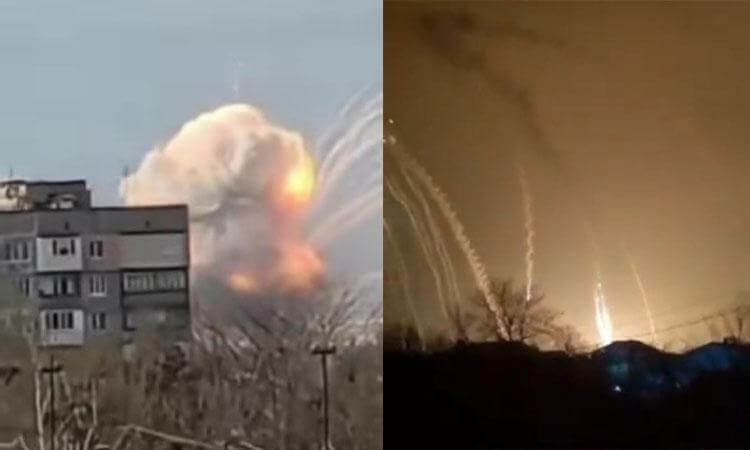DEEPIKA BHAN
As pictures of wounded women, bombed buildings, rolling tanks, fighter jet strikes and desperate civilians in Ukraine flood the TV screens and social media, India was expected to condemn the perpetrator. After all, India continues to suffer because of the expansionist policies of China and Pakistan.
Diplomacy, though, is not ruled by emotion or moral pressure; it is more about strategy and long-term prospects.
India abstained from voting on the US-sponsored UN Security Council resolution that deplored in “strongest terms” Russia’s invasion of Ukraine. The move did not come as a surprise. Maintaining a balance between the US-led front and Russia has always been the foremost part of India’s diplomacy. And it rightly followed this tradition.
India articulated the reason for the abstention in the Explanation of Vote by T.S. Tirumurti, India’s Permanent Representative to the UN. The note expressed “deep concerns at the turn of events in Ukraine”, and said that dialogue was the only solution.
Laying emphasis on dialogue rather than military action, India has reinforced its diplomacy that made it clear that pressure won’t work on its age-old policies. Even on January 31, India abstained on a procedural vote on whether to discuss the issue of Ukraine, and had then put forth its “legitimate security interests”.
India has its own concerns and knows well who the time-tested friends are and understands the politics of the fair-weather ones. This is all the more relevant in these times of continuing standoff with China in eastern Ladakh or Arunachal Pradesh. Although the US has supported New Delhi over the Ladakh impasse, India can never run the risk of annoying a dependable ally such as Russia, which is the main supplier of its defense weapon systems.
But the changing geo-politics after the imposition of sanctions against Russia may present a grim situation for the Modi government. The embargos may affect much-needed defense supplies to India from Russia, whether these are missile systems, or Kalashnikov AK-203 assault rifles, spares and components, or stealth frigates and submarines.
Although India has been buying weapons from the US as well, a balance has always been maintained between purchases from Moscow and Washington. The balance will be put to test now. With India abstaining from voting against Russia in the UNSC, the risk of projecting a neutral stance may be challenging.
The emerging situation in Ukraine may have put India’s diplomacy to test, but so far New Delhi has not shown its ambiguity on choosing fronts.
After the invasion, Ukraine has been seeking a much more proactive role from India in de-escalating the tension. Ukraine’s President Volodymyr Zelensky, knowing fully well the good chemistry between Prime Minister Narendra Modi and Russian President Vladimir Putin, made an appeal to Modi to help his country. Zelensky had a telephone conversation with Modi, wherein he sought all support.
Zelensky tweeted: “Spoke with Prime Minister @narendramodi. Informed of the course of (Ukraine) repulsing (Russian) aggression. More than 100,000 invaders are on our land. They insidiously fire on residential buildings. Urged (India) to give us political support in Security Council. Stop the aggressor together!”
Before Zelensky’s tweet, the Russian Embassy in New Delhi appreciated India’s stance in the UNSC. The embassy’s Twitter account ‘Russia in India’ noted: “Highly appreciate India’s independent and balanced position at the voting in the UNSC on February 25, 2022. In the spirit of the special and privileged strategic partnership Russia is committed to maintain close dialogue with India on the situation around Ukraine.”
Today, Ukraine is seeking help from India, but its relationship with India was not all that rosy in the past. Ukraine was one of the countries that opposed India’s nuclear tests in 1998. It also pushed for UN intervention on Kashmir after the Modi government abrogated Article 370 in 2019. Ukraine has also been a regular arms supplier to Pakistan, despite India telling the world that Pakistan supports terror activities against India.
In the present scenario, India has chosen to maintain a strategic diplomatic silence. With Zelensky openly seeking India’s help, however, India can play a major diplomatic role between Ukraine and Russia. As the US and its allies are attempting to pound Russia with sanctions and providing arms and ammunition to Ukraine, it is India that can play the peacemaker in the given situation.
India has much experience after dealing with aggression from Pakistan and China. Both the neighboring countries have been threatening and trying to intrude into India’s territory from time to time. India very well understands the tragedy of forcibly thrust wars.
India has never been the aggressor or the intruder. Its policy has been to help democracies thrive and live peacefully. This history places India in an advantageous position of bringing peace and making guns go silent to help the common folk of Ukraine. IANS






